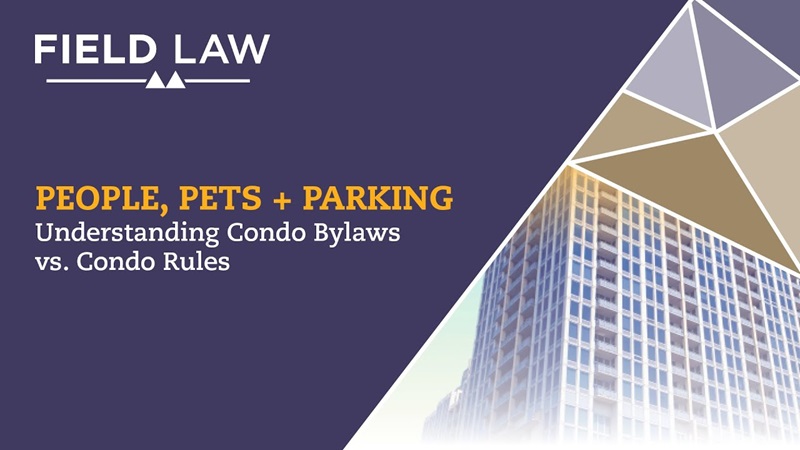Condominium Law
Key Contacts
Overview
In recent years, the Province of Alberta has seen extensive growth in the development of condominium projects.
As a result, we have developed experience in a variety of areas, including the financing, development, construction, marketing, and administration of commercial, residential, and mixed-use condominiums. Our services apply to many types of condominium development, including conventional condominiums, bare land condominiums, conversions, phased condominium developments, "barely blended" developments and those developments that may be a mix of any of the above.
Field Law helps developers and builders meet the requirements of provincial legislation and the municipal approval process. For example, we are responsible for preparing all disclosure documents required to be provided to purchasers under the Condominium Property Act. Field Law also represents developers in all aspects of the financing of condominium developments, including obtaining partial discharges of such financing as marketing and sales proceed.
In addition, our lawyers assist with the transition of the management of condominiums from developers to unit owners. We coordinate and chair turnover meetings in cooperation with developers, management companies and new owners. We also act for owners where the developer does not take sufficient responsibility concerning the operation of the condominium project prior to turnover.
Our lawyers work with condominium corporations, boards, and management companies in all aspects of condominium management and operation. We educate board members so that they are familiar with their ongoing responsibilities and assist boards with procedural and governance issues. We help corporations effect bylaw reviews and seek remedies against defaulting developers in the case of newly constructed projects. Field Law also provides advice in the enforcement of bylaws and the collection of arrears in line with statutory requirements. For condominium managers, we help with their interaction with condominium corporations, including drafting management agreements and reviewing management duties and obligations to the boards.
Finally, Field Law also acts for individual unit owners in situations where alleged defaults are committed by corporations or where a board or corporation may be guilty of improper conduct. We have acted for shadow boards where elected boards have behaved in such a manner that a shadow board is necessary to deal with a current board's improper behavior.
Many of our lawyers are active members of the Canadian Condominium Institute, North Alberta Chapter, a non-profit organization committed to providing condominium boards, owners and professionals with the knowledge and skills required to properly manage the day-to-day affairs of condominium living.
Don't miss out! Click here to join our condo email list today and receive alerts, articles, invitations to events and more!
Related
solutions
-
People, Pets and Parking: Planning + Delivering Capital Projects
Q+A Session UpcomingMar 13, 2026
12:00 PM - 01:00 PM MDT -
-
-
People, Pets + Parking: Employment Law Essentials for Managers + Boards
Q+A Session PastSep 19, 2025 -
-
Faqs
-
How are condo bylaws and rules created, enforced, and updated?
Bylaws are created and changed by special resolution of the corporation. Rules are created by the board, and may be changed/rescinded by the corporation using an ordinary resolution. Bylaws can be enforced through imposition of monetary sanctions, while rules cannot. When courts are asked to decide on enforcing a bylaw or a rule, they will consider whether it was properly enacted/passed, the fairness and the reasonableness of the proposed enforcement, and they are particularly concerned about the fairness of the process and how much notice owners were given. -
How is a condominium corporation terminated?
There are two methods to terminate a condo: Special Resolution: A condo corporation can be terminated by passing a special resolution, requiring 75% approval. ?Court Order: An application to terminate the condo can be made to the court. The court will make a decision based on the best interest of the corporation as a whole, and they will look at both economic and non-economic factors. The legal test that will be applied is whether it is “just and equitable” that the condo status be terminated in light of the rights and interests of the owners -
Is it possible to remove Board members?
In general, Board members are elected to one year terms that expire at each AGM. If owners want to remove members before the expiry of their term, they must usually petition for requisitioning a special general meeting for that purpose. This can be done by preparing a petition clearly stating the purpose of the meeting and obtaining signatures from unit owners who collectively represent at least 1,500 unit factors (15% of the corporation’s total 10,000). On receipt of such a petition, the current Board is required to convene a special general meeting within thirty (30) days. Alternatively, if your corporation is due for an AGM and you know that one will be convened soon, you could simply prepare for that by organizing other owners to nominate you or themselves for positions to the Board in order to force an election. A motion can also be made at the AGM for the removal of Board members whose terms are not expiring (e.g. if they were elected to serve a two-year term and only one year has passed). Court action should (almost always) be a last resort, but it is possible to obtain a court order for this kind of issue in a timely fashion. -
What happens if someone leaves the board and no residents are willing to join the board?
If all offices on the board were to become vacant for any reason, it is incumbent upon the last vacating board member to call a general meeting as soon as possible to elect a new board. If the last vacating board member is unable to do so, the property manager or corporation’s lawyer should call the meeting. If, at the meeting, there is no one willing to serve on the board, then an administrator must be appointed. Any owner can apply to court for the appointment of an administrator who can make decisions for the corporation. A condominium corporation must have a board of directors to act and speak on its behalf. Appointment of an administrator is a very costly step, that will ultimately be borne by all the owners whose collective unwillingness to serve on the board brought about that result. -
What is a unit factor?
“Unit Factor” is a defined term in Alberta’s Condominium Property Act. It refers to the factor assigned to each unit in a particular corporation, out of 10,000 total units for each condominium corporation (regardless of how many units there are, the total number is the same – 10,000). They are usually apportioned based on the size of the unit (square footage) relative to the total square footage for all the units, but sometimes a developer may divide the unit factors equally between the units, or on some other basis. The unit factor determines a unit’s proportionate liability for condominium fee assessments and special levies, and also correlates with how much weight a vote for that unit will have for special resolutions (e.g. to change the bylaws) and ordinary resolutions in writing. To find out your unit factor, you can look on a copy of your condominium plan (registered with the Land Titles Office), or look on your certificate of title. -
What is the difference between condo bylaws and condo rules?
The condo corporation’s bylaws are their constitution, foundational rules, and designed to have a degree of permanence, so they are more difficult to change. Bylaws regulate the corporation and provide for the control, management and administration of the units, the real and personal property of the corporation, the common property and any managed property. The condo association’s rules are like regulations, they are easier to create and change/remove, and can be used to address emerging issues and fill in the gaps in the bylaws. Rules are for addressing procedures used by the board in the administration of the corporation, the real and personal property of the corporation, the common property and managed property, but may not restrict the uses of units. -
Why might a condominium decide to terminate?
Large cost associated with repair and maintenance: Condo boards have a duty to maintain and repair the property. Where there is a large repair required but the owner’s might not be able to afford the repair, a condo might consider termination as an alternative to the repair. Termination is a last resort for a condo that cannot reasonably engage in repairs. ?Increase in land value: The value of land might increase over time, and it may be a desirable location for developers. In some cases, owners might look at terminating the condominium and selling to a developer.






